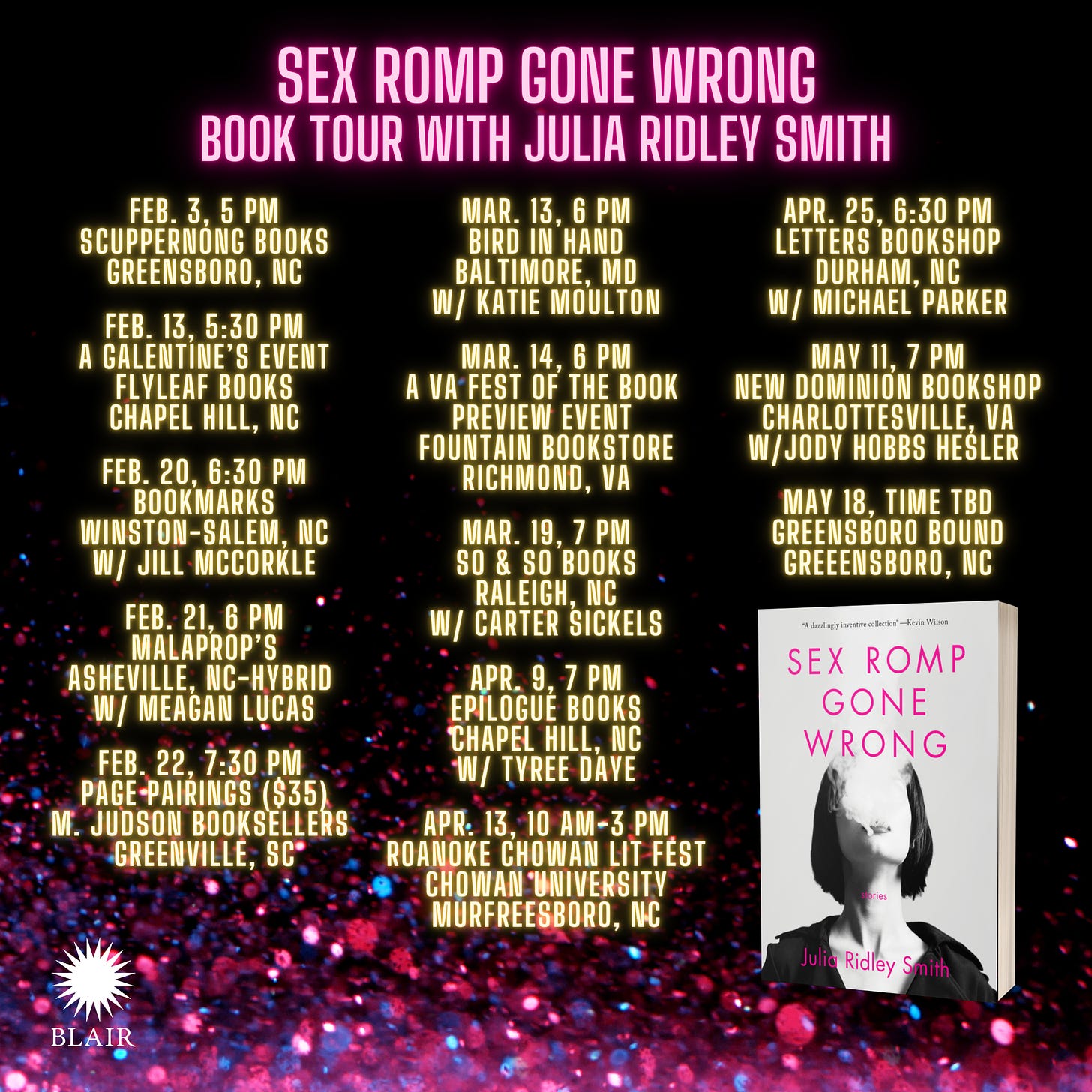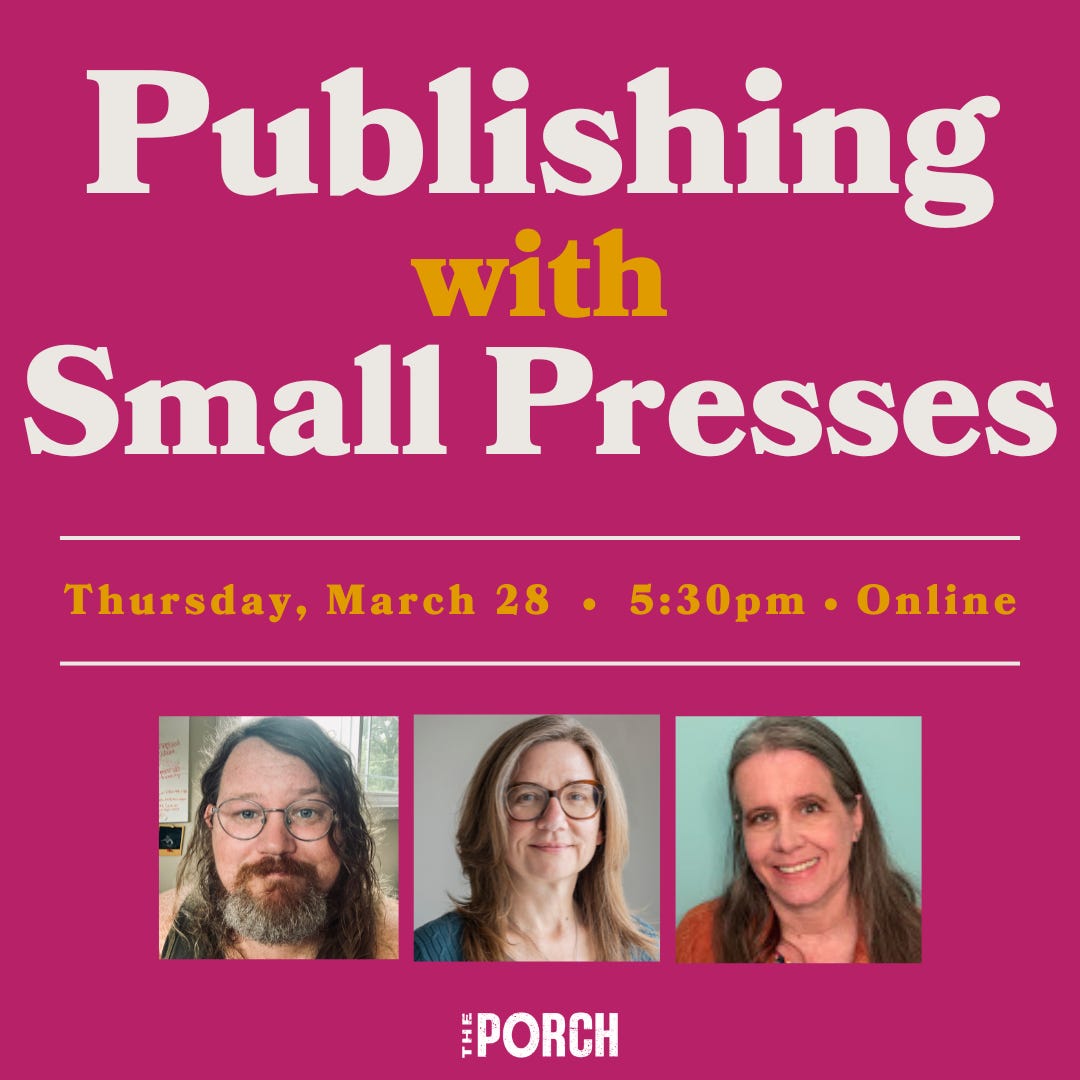"The time doesn’t magically appear. You have to make the time."
Sex Romp Gone Wrong author Julia Ridley Smith on creating characters with mixed emotions, using her observant writer's eye, and making everyone in your house learn to clean their own toilet
Hello there! This is a good creatures interview, a series that explores the intersection of caregiving and creative practice. I’m so excited to showcase people doing lots of kinds of caregiving—people caring for kids or pets or other family members and/or caring for space through gardening or community work or activism—and lots of kinds of creative work.
If you know (or are!) a good creature whose work we should feature, send me an email—you can just reply to this newsletter.
Today’s interview is with Julia Ridley Smith, the author of the brand-new story collection Sex Romp Gone Wrong and the memoir The Sum of Trifles. What I love about Julia’s work is her ability to flip from darkly funny to just dark to deeply moving and back. The Sum of Trifles is a really complex exploration of both the stuff our loved ones leave us and the fraught emotional and historical legacies we often find ourselves with. The book begins with after Smith’s parents have died within six months of each other, leaving a house full of antiques and artifacts, and it moves to consider her family’s history of slaveowning. It’s a remarkable book, and a model especially for white writers looking to examine difficult family history. Sex Romp Gone Wrong (that title!) is full of women making questionable choices that will make you both laugh and wince in recognition. (I hope that’s not just me!)
Below, we talk about how caregiving has forced her to become more comfortable with uncertainty, how creativity has helped her become more flexible and resilient, and avoiding the trap of waiting to write until everything on your to-do list is ticked off.
Who do you care for?
My family—20-year-old son, husband, 2 dogs—and my creative writing students at UNC Chapel Hill. I also have a lot of friends and chosen family that I care for in various ways.
What kind of creative work do you do?
I write fiction and creative nonfiction.
Caregiving has helped me develop my capacity for holding multiple, conflicting ideas and feelings at the same time. I’ve had to get more comfortable with uncertainty, and more accepting of my inability to control what happens to the people I love.

❤️️ if you’ve learned from the creative caregivers in this series, clicking the heart at the top or bottom of this newsletter will help other writers find us! ❤️️
What are some ways care-giving fosters creativity and vice versa?
When you’re caring for someone, you love them, you resent them, you want to be with them, you want to escape them. You worry a lot, and you want so much to help them, but you also get sick of thinking about them. Caregiving has helped me develop my capacity for holding multiple, conflicting ideas and feelings at the same time. I’ve had to get more comfortable with uncertainty, and more accepting of my inability to control what happens to the people I love.
I think that’s made me better at creating characters whose mixed emotions contribute to the trouble they get into. In my new story collection, Sex Romp Gone Wrong, many of the women are caregivers. Their conflicting desires and responsibilities drive what happens in the stories and how they react.
Vice versa: my creativity helps me be flexible and resilient during difficult situations. It helps me solve problems. Also, having an observant writer’s eye makes me stop during stressful moments and notice what’s funny or beautiful or terrifying. Besides possibly giving me fodder for writing, this noticing—this seeing—helps me try to experience even the awful moments in a way that makes me feel alive and alert.
Is there something specific you do to jumpstart creativity?
I get a lot of ideas when I’m walking outdoors. Looking at art is important to me. Watching movies. Reading. All of that juices up my brain and my heart, and sparks stories or ideas that I’m eager to write down.
What’s changed about your process? About your medium or genre?
My caregiving experiences have informed my fiction, and they also directly led me to working in a new genre. I wrote the stories in Sex Romp Gone Wrong over about twenty years. In the middle of that period, I went through all the end-of-life stuff with my parents, and after they died, I was surprised to find myself writing essays. I’d thought of myself solely as a fiction writer up until that point.
When I started writing about cleaning out my parents’ house, I realized I needed a different form. Creative nonfiction allowed me to write about my folks and my grief, and it also gave me room to incorporate research and to explore broader questions about how our possessions and our inheritances shape our identities. Those essays became my first book, The Sum of Trifles.
The to-do list never ends. The time doesn’t magically appear. You have to make the time.
What advice would you give someone who has a creative practice and is embarking on becoming a caregiver?
It’s hard to give advice because everybody’s situation is different. So I’ll just say this: I used to think that once I checked enough things off my list, the writing time would appear. But the to-do list never ends. The time doesn’t magically appear. You have to make the time. Now I try to be intentional about setting my writing time each week and not giving it away to anybody.
Also, as much as possible, teach everybody in your household to make their own lunch, wash their own clothes, and clean their own toilet. Then be determined not to care when they don’t do it the way you would’ve done it.
Julia Ridley Smith is the author of a short story collection, Sex Romp Gone Wrong (Blair, 2024), and a memoir, The Sum of Trifles (University of Georgia Press, 2021). Her stories and essays have appeared in Alaska Quarterly Review, The Cincinnati Review, Ecotone, Electric Literature, the New England Review, and The Southern Review, among other places. Her work has been recognized as notable in Best American Essays and supported by the Sewanee Writers Conference, the Virginia Center for the Creative Arts, the United Arts Council of Greater Greensboro, and other arts organizations. She teaches creative writing at the University of North Carolina at Chapel Hill.
You can get updates on Julia’s work and events via her newsletter, Romps and Trifles, and you can find her on instagram at @juliatrifles and facebook at @juliaridleysmithwriter.
She’s participating in a zoom event, Publishing with Small Presses: A Panel, with Amy Cipolla Barnes and Nathan Knapp, hosted by The Porch, at 5:30–7 pm CT on March 28, if you’d like to join.
Write More, Be Less Careful is a newsletter about why writing is hard & how to do it anyway. You can find my books here and read other recent writing here. If you’d like occasional dog photos, glimpses of my walks around town, and writing process snapshots, find me on instagram.
If Write More has helped you in your creative life, I’d love it if you would share it with a friend.








Smith offers so many great suggestions, especially make the time to write because the to-do list will never end, and make others clean their own toilets and laundry and make their own lunches!
I really like the advice to "be determined not to care when they don't do it the way you would've done it." I'm still working on that one, but it's a great reminder that if you want something done by someone else, you have to let them do it their way. :)